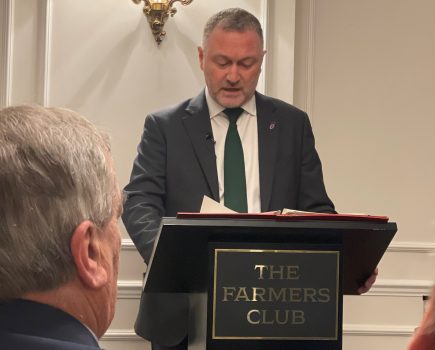“£30,000,” the auctioneer shouts at me in an excited tone. The man directly in front of me has made the previous bid. It is down to me to bid next as everyone else has dropped out. My opponent fixes me with a steely gaze, daring me to lift my finger.
I know I am already seriously off-wicket. I’ve done my research about the value of the tractor prior to the sale and promised myself not to go beyond £28,000 for this 20-year old, 130hp John Deere.
“Maintained by the original dealer from new – what a lovely example!” chips in the auctioneer winningly. Up goes my hand. I display five fingers to indicate a bid of just an additional £500. The bidding, up to that point, has been going up in thousands. In a slightly disappointed tone the auctioneer mutters “£30,500”.
I’m never sure about the tactic of making increasingly smaller incremental bids at auctions as the price of a lot increases. I hope it slows down the auctioneer and gives other bidders time to contemplate just how much money they’re spending.
But I also worry that it signals that I’m near the top of my price range and so just one more bid will knock me out. Sure enough, my rival bids again. “£31,000,” shouts the auctioneer, staring at me again for a counterbid. He instructs the driver of the tractor and trailer that is towing him around the sale to turn the engine off. It helps increase the sense of theatre.
I should stop. But the thought of a conversation I’ve had, minutes earlier, with a farming friend clouds my judgement. He‘s told me that he couldn’t even buy a new tractor at the moment, let alone a smart second hand one, as there is a year-long waiting list, and that every time he does speak to a salesman “they put another £10,000 on the price”.
“Very low hours for its age,“ says the auctioneer, as if understanding that I am the owner of tractors with very high hours for their age. I survey the desirable, glistening green, under-worked workhorse before me and nod. “£31,500,” he shouts in triumph. I shudder at the thought that this is more than the tractor cost new.
I hope that my long pause has communicated to my rival bidder that the price of the tractor is now very high indeed. But everything I do just seems to be interpreted by him as a sign of weakness and he bids again.
“£32,000!” shouts the auctioneer. Sensing that I’m near my limit he goads me with: “Come on, Stephen, what’s another five hundred quid?”
And with that, I smile. Unintentionally, he’s released me from the slightest desire to keep on bidding.







